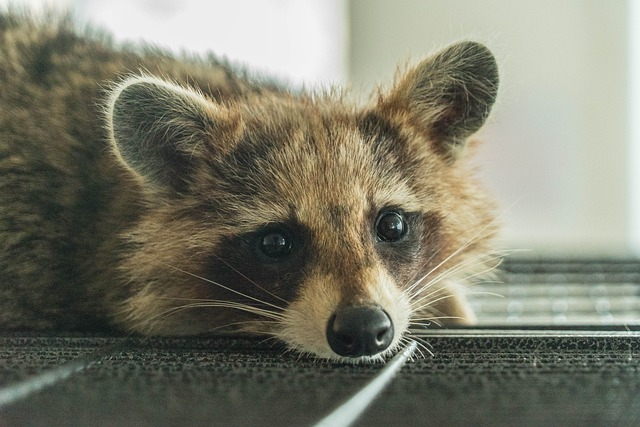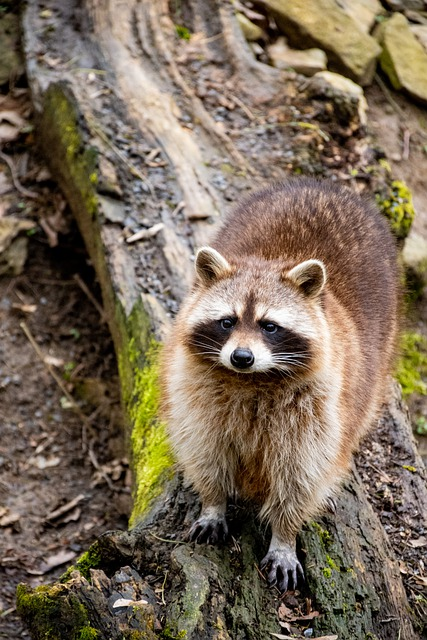Ever looked at a raccoon and thought, “What a fascinating creature! I wonder what it would be like to have one as a pet?” Well, buckle up, because today you’re in for a wild ride as we explore the wonderful world of pet raccoon care, challenges, and whether or not they’re the right fit for you!
Key Takeaways
-
Ready for a wild ride? Owning a pet raccoon takes dedication, patience and an understanding of their mischievous ways!
-
Make sure they have enough space, balanced diet and regular vet checkups – plus don’t forget the occasional pampering session.
-
If you want all the fun without commitment try adopting from wildlife rehabilitator – it’s like having a furry sleepover!
Understanding Pet Raccoons

Raccoons, or Procyon lotor for the fancy-schmancy folks, are notorious for their dastardly criminal mastermind reputation, reaching 16 to 28 inches in length and weighing a hefty 7 to 20 pounds. These intelligent animals are a far cry from your average cuddly pet, and owning one is not for the faint of heart, especially when dealing with raccoon droppings.
Before embarking on the raccoon rollercoaster, it’s worth exploring the world of pet raccoons, understanding their distinctive personalities, and distinguishing between wild and domesticated raccoons.
Raccoon Personality Traits
Raccoons are renowned for their remarkable memories and superior problem-solving skills, making them an interesting species to breed raccoons. Raccoons tend to be playful and cuddly, which can be quite endearing, but don’t let that fool you. They can also be feisty and possessive, especially when they don’t get their way.
They are known to bite even their favorite humans, and their aggression may extend to other pets in your home. So, if you’re thinking about having a raccoon as a pet, be prepared for some serious mischief and a wild ride!
Wild vs. Domesticated Raccoons
While domesticated raccoons may be more manageable than their wild counterparts, they still retain many wild instincts and behaviors. It’s not recommended to pluck a raccoon from the wild and try to domesticate it. Instead, it’s better to consult a licensed wildlife rehabilitator or find a reputable raccoon breeder to ensure your pet raccoon is not too wild.
Remember, raccoons are wild animals at heart, and no amount of cuddling and cooing will change that wild animal fact. Encountering a wild raccoon, especially young raccoons, can be an interesting experience, but it’s essential to remember their true nature.
Legalities and Regulations

Before you eagerly set out to adopt a raccoon companion, you must take into account the legalities and regulations associated with pet raccoon ownership. Owning a pet raccoon is illegal in many areas, and regulations vary by state or country.
In some states, permits are mandatory, while others have strict regulations or outright bans on raccoon ownership. Researching local laws is vital to avoid legal ramifications and to guarantee the safety and wellbeing of your raccoon companion.
Permit Requirements
In states where raccoon ownership is allowed, also known as pet raccoon legal states, such as Florida, Michigan, Nebraska, and Delaware, permits or licenses are often required, and the requirements can vary.
Vermont and Arkansas are the only states where permits are not required, but it’s always best to check the specific laws in your state to avoid any surprises.
Consequences of Illegal Ownership
If you’re caught owning a raccoon illegally, you could face some serious consequences, including hefty fines, confiscation of your furry friend, and even jail time.
So be sure to do your research, follow the law, and give your raccoon the legal and loving home it deserves.
Caring for Your Pet Raccoon
Having covered the legal aspects, it’s now time to delve into the intricacies of raccoon care. Providing a proper home, balanced diet, and regular veterinary care is essential for your pet raccoon’s health and happiness.
From housing and space needs to diet and nutrition, we’ll cover all you need to know to keep your raccoon buddy healthy and content.
Housing and Space Needs
A spacious and secure outdoor enclosure with a roof is a must for your pet raccoon, ensuring they have plenty of room to roam and explore. The ideal dimensions for an outdoor enclosure are at least 20 feet by 20 feet with a minimum height of 6 feet and a minimum floor area of 300 square feet per adult raccoon. Sturdy and durable materials, such as 1” welded wire mesh on a wood frame, are recommended to prevent your raccoon from escaping.
In addition to their outdoor palace, raccoons need a raccoon-proofed indoor living space where they can sleep and spend time when they’re not exploring outdoors. This indoor area should be safe and secure, with child-proof locks on cabinets and doors to keep your curious critter from getting into trouble.
Diet and Nutrition
Maintaining a balanced diet is crucial for your pet raccoon’s wellbeing. As raccoons eat various types of food, their meals should include a mix of:
-
Fruits
-
Vegetables
-
Proteins
-
Occasional treats
Be sure to consult with your veterinarian to determine the appropriate portion sizes and variety of foods for your raccoon’s age, size, and activity level.
It’s also important to provide your raccoon with fresh water at all times, and don’t forget those occasional pampering sessions with a mild shampoo to keep their coat clean and shiny.
Health Risks and Veterinary Care
Since raccoons can harbor diseases and parasites, finding an experienced exotic animal veterinarian is crucial for maintaining your pet’s health. Regular checkups and vaccinations can help prevent illness and address any health concerns before they become serious issues.
In addition to regular veterinary care, it’s important to monitor your raccoon for signs of illness, such as lethargy, lack of coordination, or changes in behavior. Keeping an eye on your raccoon’s health and addressing any concerns promptly can help ensure your furry friend enjoys a long, happy life.
Challenges and Considerations
Owning a pet raccoon is not all fun and games; there are several challenges and considerations to keep in mind. From training and socialization to the impact on other pets and the long-term commitment, owning a raccoon requires dedication, patience, and a deep understanding of these mischievous animals.
Socialization and Training
Training a pet raccoon can be quite an adventure, as these intelligent creatures can be both stubborn and independent. While raccoons can learn their names and even a few commands like “sit” and “shake a paw,” their wild instincts make them a handful to train. Consistency, patience, and positive reinforcement are key to successfully training your pet raccoon.
Socialization is also crucial for preventing aggression and ensuring your raccoon gets along with humans and other animals. Gradually exposing your raccoon to new people, animals, and environments can help them become more comfortable and well-adjusted. Just remember, raccoons are wild animals, and their behavior can be unpredictable, so always proceed with caution and patience.
Impact on Other Pets
Pet raccoons may not be the best playmates for your other pets, as their feisty nature and potential aggression can pose a risk to their safety. Introducing a pet raccoon raccoons to other pets should be done carefully and under close supervision to avoid any conflicts or injuries.
Additionally, raccoons can carry diseases and parasites that could affect your other pets, so it’s important to keep a close eye on their interactions and ensure all animals are healthy and up-to-date on their vaccinations.
Long-Term Commitment
As raccoons can live up to 20 years in captivity, potential owners should be prepared for a long-term commitment to their furry friend. Daily care, socialization, and veterinary visits are essential to ensuring your raccoon stays healthy and happy throughout their life.
If you’re ready to take on the challenges and responsibilities of raccoon ownership, you’ll be rewarded with a unique and unforgettable pet experience.
Alternatives to Pet Raccoons
If, after learning about the challenges and responsibilities of owning a pet raccoon, you’re still itching for an exotic pet but aren’t sure a raccoon is right for you, fear not!
There are alternative options to consider, such as adopting domesticated animals from a wildlife rehabilitator or exploring other exotic pet options with different care requirements and legalities.
Exotic Pet Options
There is a wide array of exotic pets, including skunks, foxes, genets, and stoats, that possess traits similar to raccoons but vary in care needs and legal requirements. When contemplating any exotic pet, it’s crucial to investigate their specific care needs, locate a specialist veterinarian, and acquaint yourself with the applicable local laws and regulations.
Remember, owning an exotic pet is a big responsibility, and it’s important to ensure you’re prepared to provide the care and commitment they need to thrive. So, whether you decide to stick with a raccoon or explore other exotic options, be sure you’re ready for the wild ride ahead!
Adopting from a Wildlife Rehabilitator
If you’re not quite ready for the long-term commitment of owning a pet raccoon, adopting from a wildlife rehabilitator might be the perfect solution. This option allows you to provide temporary care for a raccoon in need while still experiencing the unique aspects of raccoon care.
Be sure to contact a licensed wildlife rehabilitator to discuss the possibility of fostering a raccoon and ensure you’re equipped to provide the care and attention they need during their stay with you.
Summary
In conclusion, owning a pet raccoon is an exciting and unique experience, but it’s not without its challenges and responsibilities. From understanding their wild instincts and legalities to providing proper care and navigating the impact on other pets, owning a raccoon is a commitment that requires dedication, patience, and love. If you’re ready and able to provide the best possible home for a raccoon, you’ll be rewarded with a fascinating and unforgettable companion. Good luck on your raccoon adventure!
Frequently Asked Questions
Do raccoons make good pets?
It’s probably best to admire raccoons from afar, as they are high maintenance, unpredictable and prone to damage your home and bite when unhappy. Not the ideal pet, that’s for sure!
Which states is it legal to own a raccoon?
Owning a pet raccoon is perfectly legal in Arkansas, Delaware, Florida, Illinois, Indiana, Maine, Michigan, Nebraska, New Jersey, Ohio, Oklahoma, South Dakota, Tennessee, Vermont, Wisconsin and Wyoming – all you need is the proper permit or license!
Are male or female raccoons more aggressive?
It appears that female raccoons can be a bit feistier than their male counterparts – though only if they feel that their kits are in danger. So, if you come across an angry mama raccoon, it’s probably best to give her some space!
What is the ideal diet for a pet raccoon?
Feed your pet raccoon a delicious variety of fruits, veggies, proteins, and treats to keep them happy and healthy – just don’t forget the occasional special surprise!
How can I raccoon-proof my home?
Secure your cabinets and doors with child-proof locks and keep any hazards far away to raccoon-proof your home.


